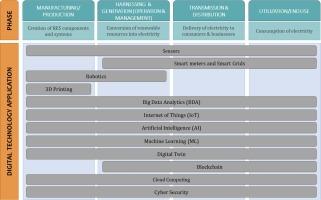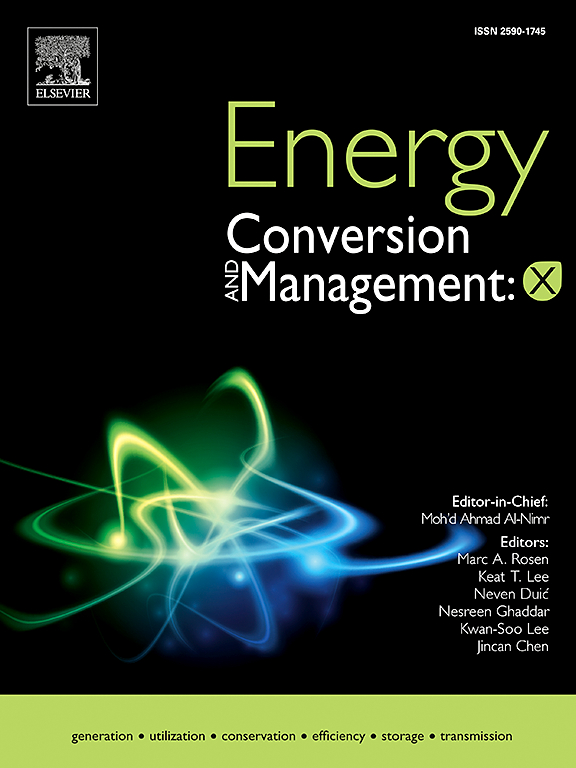Industry 4.0 digital technologies for the advancement of renewable energy: Functions, applications, potential and challenges
IF 7.1
Q1 ENERGY & FUELS
引用次数: 0
Abstract
The Fourth Industrial Revolution, driven by Industry 4.0 technologies, is rapidly transforming the Renewable Energy Sector (RES), offering significant benefits across the entire value chain of renewable energy systems. This study contributes to the literature by systematically investigating the role of 13 key Industry 4.0 digital technologies − Smart meters, Smart grids, Artificial Intelligence, Machine Learning, Digital Twin, 3D Printing, Big Data Analytics, Robotics, Sensors, Internet of Things, Cloud computing, Blockchain, and Cyber Security − in terms of their functions, applications, and potential in the RES. It further examines market dynamics, growth trajectories, and policy implications of Industry 4.0 technologies, highlighting the practical applications and challenges encountered in their adoption in RES. Utilizing a mixed-methods approach, which combines a systematic literature review adopting the PRISMA methodology with insights from industry reports and case studies, the study finds that Industry 4.0 technologies play a critical role in enhancing efficiency, cost-effectiveness, and sustainability in areas such as renewable energy systems’ operation, integration, energy production, management, and maintenance. For example, in the case of solar panels, AI-powered systems can optimize energy production and consumption, potentially leading to a 20% increase in efficiency and a 50% reduction in production cost. Furthermore, the study reflects on the challenges faced by the discussed technologies, including interoperability issues, cybersecurity risks, high implementation costs, and potential job displacement. It concludes that addressing these challenges through collaborative efforts and policy interventions is crucial to fully harness the transformative potential of digital technologies in the RES.

工业 4.0 数字技术促进可再生能源发展:功能、应用、潜力和挑战
在工业 4.0 技术的推动下,第四次工业革命正在迅速改变可再生能源行业(RES),为可再生能源系统的整个价值链带来巨大效益。本研究通过系统研究 13 项关键工业 4.0 数字技术(智能电表、智能电网、人工智能、机器学习、数字孪生、3D 打印、大数据分析、机器人技术、传感器、物联网、云计算、区块链和网络安全)在可再生能源领域的功能、应用和潜力,为相关文献做出了贡献。报告进一步研究了工业 4.0 技术的市场动态、增长轨迹和政策影响,重点介绍了这些技术在可再生能源领域的实际应用和遇到的挑战。本研究采用混合方法,将采用 PRISMA 方法的系统文献综述与来自行业报告和案例研究的见解相结合,发现工业 4.0 技术在提高可再生能源系统的运行、集成、能源生产、管理和维护等领域的效率、成本效益和可持续性方面发挥着至关重要的作用。例如,就太阳能电池板而言,人工智能驱动的系统可以优化能源生产和消耗,从而有可能将效率提高 20%,将生产成本降低 50%。此外,研究还反思了所讨论的技术面临的挑战,包括互操作性问题、网络安全风险、高昂的实施成本和潜在的工作岗位转移。研究得出结论,通过合作努力和政策干预来应对这些挑战,对于充分利用可再生能源领域数字技术的变革潜力至关重要。
本文章由计算机程序翻译,如有差异,请以英文原文为准。
求助全文
约1分钟内获得全文
求助全文
来源期刊

Energy Conversion and Management-X
Multiple-
CiteScore
8.80
自引率
3.20%
发文量
180
审稿时长
58 days
期刊介绍:
Energy Conversion and Management: X is the open access extension of the reputable journal Energy Conversion and Management, serving as a platform for interdisciplinary research on a wide array of critical energy subjects. The journal is dedicated to publishing original contributions and in-depth technical review articles that present groundbreaking research on topics spanning energy generation, utilization, conversion, storage, transmission, conservation, management, and sustainability.
The scope of Energy Conversion and Management: X encompasses various forms of energy, including mechanical, thermal, nuclear, chemical, electromagnetic, magnetic, and electric energy. It addresses all known energy resources, highlighting both conventional sources like fossil fuels and nuclear power, as well as renewable resources such as solar, biomass, hydro, wind, geothermal, and ocean energy.
 求助内容:
求助内容: 应助结果提醒方式:
应助结果提醒方式:


